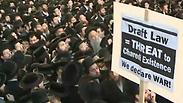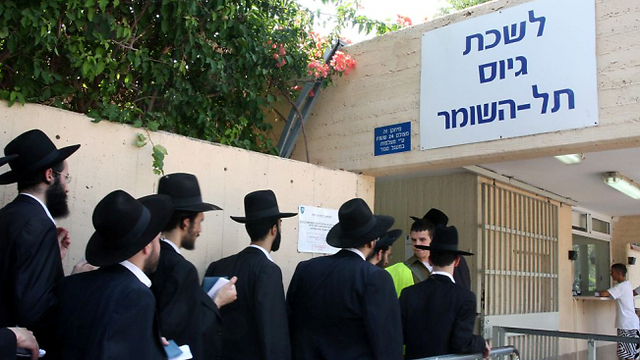

Haredi draft ruling: High Court at the public’s service
Op-ed: Court’s decision to strike down law allowing mass ultra-Orthodox exemptions from military service is an important milestone against political cynicism in which a minority repeatedly prevents State of Israel from being a slightly more decent and civilized country.
But the High Court ruling is an important milestone against the cynicism in which an ultra-Orthodox minority repeatedly prevents the State of Israel from being a slightly more decent and civilized country.
We should remember the affair began with an insignificant, tolerable exemption of a few hundred yeshiva students in the David Ben-Gurion era. But the exemption intensified. It went beyond any acceptable limit. The percentage of Haredim exempted from military service kept growing. It’s not that the process can’t be stopped. The previous government passed a law which began—just began—to deal with this disease and the damage it has caused.

The Haredi draft, also known as "equality in sharing the burden" of IDF service, is just part of a much bigger problem. Nearly one-quarter of first graders today belong to the Haredi sector. This means that in the not-so-distant future, they won’t enlist. If we add the Arab sector to the equation, the result is that nearly 50 percent of Israelis will be exempted from military service. That’s an intolerable situation.
What makes this whole issue even worse is the fact it’s part of a much more troubling package deal: those who don’t enlist also skip core curriculum studies, receive huge allowances and vanish from the labor market.
Things began changing in the previous government, but like with the Western Wall and conversion crises, Prime Minister Benjamin Netanyahu is willing to give the Haredim everything, ignoring the fact that even if he didn’t give them anything—they would have no other option.
This is causing serious, gradual damage to the national interest. Instead of a democracy, we are getting a minocracy. There's a majority both among the public and in the Knesset for equally sharing the burden of military service, for core studies, for encouraging integration into the labor market. But who cares about the majority and who cares about the national interest when concessions are being made without a second thought.
In a normal state of affairs, the High Court of Justice shouldn’t intervene. Overturning laws and overturning cabinet decisions should be used as an emergency weapon and only in rare cases. There have been too many times in which the High Court’s intervention was irritating and unnecessary. Not this time.
The ruling is justified for two reasons: First of all, because waiving an equal share of the civic duty is unconstitutional and undemocratic, and although we have gotten used to it, it crosses a red line. Second, unlike precedents in which the High Court ruled in favor of a minority while crushing the majority’s will, this time the High Court ruled in favor of the majority and became the public’s servant against political cynicism.
It’s unclear whether Tuesday’s ruling will lead to a change. The destructive coalition majority, in which Knesset members vote against their personal views, will likely persist. But the public aversion will grow accordingly. It joins the aversion over the conversion legislation empowering the Haredim and the decision to nix a planned egalitarian prayer section at the Western Wall.
All it takes right now is six or seven lawmakers from the Kulanu and Yisrael Beytenu parties to do exactly what they promised their voters regarding these issues. They can erase the disgrace. They have to. The High Court ruling offers them another chance. For our sake, for the sake of the national interest, they should seize the opportunity. The ball is in their court.
















